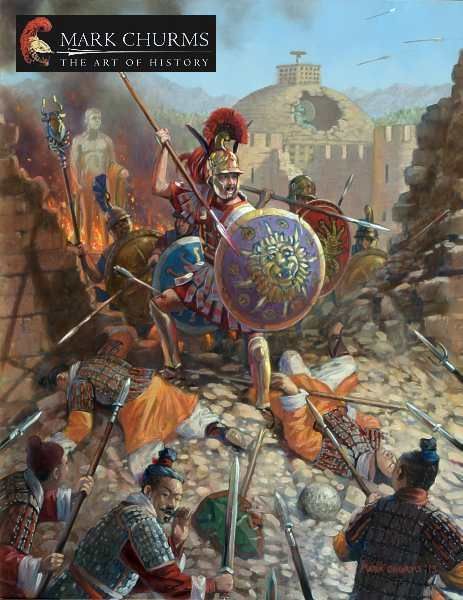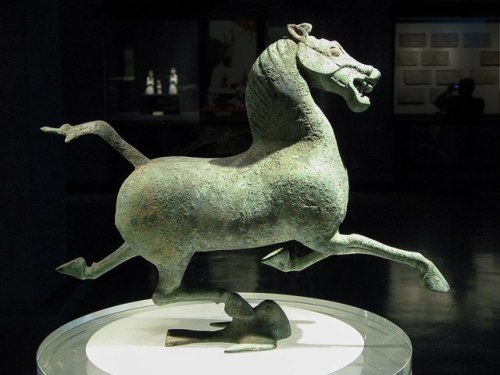Ancient Greeks vs. Han China, The War of the Heavenly HorsesBy the death of Alexander the Great in 3
Ancient Greeks vs. Han China, The War of the Heavenly HorsesBy the death of Alexander the Great in 323 BC the Macedonian Empire stretched from Greece in the West all the way to Northern India in the East. One of the most remote cities named after Alexander was Alexandria Eschate, literally meaning Alexandria the Farthest, located in what is today the southwestern end of the Ferghana Valley in Tajikstan. The city was founded by Greek colonists and former Macedonian soldiers retired from Alexander’s army, who were granted land as a reward from their service. Nearly two hundred years later Alexandria Eschate was a thriving Greco-Bactrian city when it was visited by the Chinese explorer Zhang Qian in 130 BC. Zhang Quang returned to the Han Emperor with reports of incredibly fast, strong, and rugged horses which were bred by the Dayuan (Greater Ionians aka Greeks) living in the Ferghana Valley. The Chinese greatly desired the horses to help fend off the Xiongnu, a confederation of nomadic horse tribes who lived in the northern steppes of what is now Mongolia. Like most nomadic horse tribes throughout history, they were a major pain in the butt for their neighbors at best, and dangerous enemies at worst. The Chinese were looking to acquire Ferghana horses to help level the playing field against the Xiongnu.At first the Chinese and Dayuan traded a limited number of horses, however the Greeks refused to trade more. When an incident occurred that led to the death of a Chinese ambassador, China declared war on the Dayuan. The Han Emperor sent an army of 30,000 infantry and 6,000 cavalry to conquer Alexandria Eschate led by the general Li Guangli in 104 BC. Unfortunately for the Chinese, the operation would be extremely difficult as they had to cross through the rugged and barren Taklaman Desert in what is now the Xinjian Uyghur Autonomous Region. While traveling through the region, Li Guangli demanded local towns, city states, and tribes provide his army with food and provisions. Most refused resulting in petty conflicts. By the time the Chinese army had arrived at Alexander Eschate half of it’s men had died of starvation, exhaustion, disease, and exposure. The remained were not fit for combat, forcing Li Guangli to retreat for home. Few returned alive.In 102 BC the Emperor gave Li Guangli an army twice the size, this time better equipped with pack animals and supplies for the journey. Again the army traveled through the Taklaman Desert, however this time it was large enough to quell most opposition, and the local factions willingly supplied the army with food in order to avoid war. Regardless by the time the army arrived at Alexandria Eschate, half of the men had died from the harsh conditions. The army laid siege to Alexandria Eschate. After 40 days the Chinese were able to break through the city’s outer wall and cut off it’s water supply. The Dayuan surrendered and presented the head of their king to Li Guangli on a platter. A puppet ruler was appointed in his stead, and the army returned with a tribute of 3,000 horses which were used for breeding.Li Guangli’s army returned to China with around 10,000 men, around 1/6th of its original size. The Furghana Valley and Taklaman Desert become territory of the Han Empire as a result of the expedition. The short war between Han China and the Furghana Valley Greeks is one of the first documented instances of contact between China and a European culture. It was also signal a beginning of the important historical trade network known as the Silk Road. -- source link
Tumblr Blog : peashooter85.tumblr.com
#history#ancient history#ancient greece#ancient china#military history#alexander eschate


